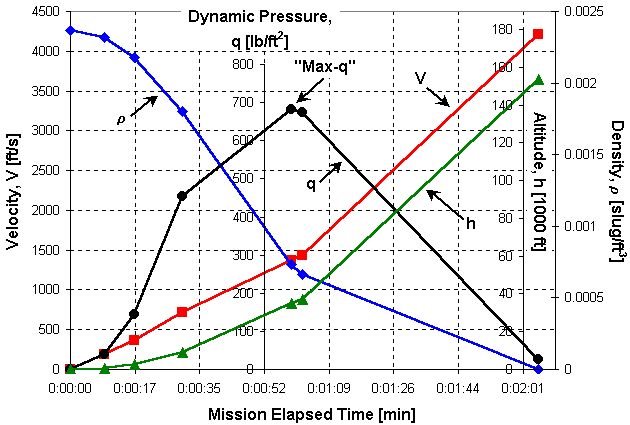Page 2 of 2
Re: Ares 1-X Launch (2009 Nov 2)
Posted: Tue Nov 03, 2009 10:10 pm
by apodman
Accelerating on a level road perpendicular to the Earth's gravity, (not up into the yonder nor down into free fall), our friend Pythagoras would have to handle 1.06 g (1 g vertical and .35 g horizontal) to accelerate like the Ares or 1.18 g (1 g vertical and .63 g horizontal) to accelerate like the Shuttle.
Re: Ares 1-X Launch (2009 Nov 2)
Posted: Wed Nov 04, 2009 2:56 am
by geckzilla
I'm glad you guys have practical applications for math.
Re: Ares 1-X Launch (2009 Nov 2)
Posted: Wed Nov 04, 2009 4:43 am
by silent lurker
Its my understanding that the image was taken as the vehicle reached "Max Q," the point of maximum aerodynamic pressure on the vehicle which, if I recall correctly, corresponds to it passing Mach 1 and going supersonic. Most of the time we see this supersonic shock condensation cone only on high performance jet aircraft breaking the sound barrier. Its less common to see it on a rocket.
Re: Ares 1-X Launch (2009 Nov 2)
Posted: Wed Nov 04, 2009 1:51 pm
by neufer
silent lurker wrote:Its my understanding that the image was taken as the vehicle reached "Max Q," the point of maximum aerodynamic pressure on the vehicle which, if I recall correctly, corresponds to it passing Mach 1 and going supersonic. Most of the time we see this supersonic shock condensation cone only on high performance jet aircraft breaking the sound barrier. Its less common to see it on a rocket.
No doubt this is a
Mach ~0.85 transonic shock collar but it has little to do with "Max Q."
http://en.wikipedia.org/wiki/Prandtl%E2%80%93Glauert_singularity wrote:
The Prandtl–Glauert singularity or P.G. singularity is sometimes referred to as a vapor cone, shock collar, or shock egg. The point at which a sudden drop in air pressure occurs is generally accepted as the cause of the visible condensation cloud that often surrounds an aircraft traveling at
transonic speeds, though there remains some debate. These condensation clouds, also known as "shock collars" or "shock eggs," are frequently seen during Space Shuttle launches around 25 to 33 seconds after launch when the vehicle is traveling at
transonic speeds.
"Max Q" generally occurs when the vehicle is
hypersonic but there is still significant air density
such that the dynamic pressure (density x velocity squared) is greatest.
The space shuttle breaks the sound barrier at an altitude of about 20,000 feet
but reaches "Max Q" only at about 35,000 feet at
Mach 1.35.

Re: Ares 1-X Launch (2009 Nov 2)
Posted: Wed Nov 04, 2009 4:36 pm
by jerbil
Do people still use ft-lbs on your side of the pond?
Re: Ares 1-X Launch (2009 Nov 2)
Posted: Wed Nov 04, 2009 4:52 pm
by Chris Peterson
jerbil wrote:Do people still use ft-lbs on your side of the pond?
Sadly, some do. In the space program, it is part of our special patented system for crashing billion dollar probes into planets.
The units used on the chart Neufer posted are almost nauseating. ft-lbs is bad enough, but slugs/ft^3 is really awful. It would be nearly impossible to use this information constructively without doing a lot of conversions, which each one a chance for things to go wrong.
But most Americans know that switching to proper units would just be a Commie plot to destroy the youth of our nation!
Re: Ares 1-X Launch (2009 Nov 2)
Posted: Wed Nov 04, 2009 5:32 pm
by neufer
Chris Peterson wrote:jerbil wrote:Do people still use ft-lbs on your side of the pond?
Sadly, some do. In the space program, it is part of our special patented system for crashing billion dollar probes into planets.
http://en.wikipedia.org/wiki/Mars_Climate_Orbiter
<<The Mars Climate Orbiter was intended to enter orbit at an altitude of 140.5–150 km (460,000-500,000 ft.) above Mars. However, a navigation error caused the spacecraft to reach as low as 57 km (190,000 ft.). The spacecraft was destroyed by atmospheric stresses and friction at this low altitude. The navigation error arose because a NASA subcontractor, Lockheed Martin, used imperial units (pound-seconds) instead of the metric system.>>
http://en.wikipedia.org/wiki/Gimli_Glider
<<On 23 July 1983, Air Canada Flight 143, a Boeing 767-200 jet, ran completely out of fuel at 41,000 feet (12,500 m) altitude, about halfway through its flight from Montreal to Edmonton via Ottawa. The crew was able to glide the aircraft safely to an emergency landing at Gimli Industrial Park Airport, a former airbase at Gimli, Manitoba. Fuel loading was miscalculated through misunderstanding of the recently adopted metric system which replaced the Imperial system.>>
Chris Peterson wrote:
The units used on the chart Neufer posted are almost nauseating. ft-lbs is bad enough, but slugs/ft^3 is really awful.

Chris Peterson wrote:It would be nearly impossible to use this information constructively without doing a lot of conversions, which each one a chance for things to go wrong. But most Americans know that switching to proper units would just be a Commie plot to destroy the youth of our nation!
- <<The grain (Symbol: gr) is equal to 0.06479891 grams (Symbol: g). Medical errors in the US are sometimes attributed to the confusion between grains and grams. A patient received phenobarbital 0.5 grams instead of 0.5 grains (0.03 grams) after the prescriber misread the prescription>>
Re: Ares 1-X Launch (2009 Nov 2)
Posted: Wed Nov 04, 2009 11:15 pm
by Star*Hopper
Chris Peterson wrote:jerbil wrote:Do people still use ft-lbs on your side of the pond?
"...
But most Americans know that switching to proper units would just be a Commie plot to destroy the youth of our nation!"
I've been saying for 30-some years - we'll switch to your "proper units" just's soon as you get 'em standardized.
~*

